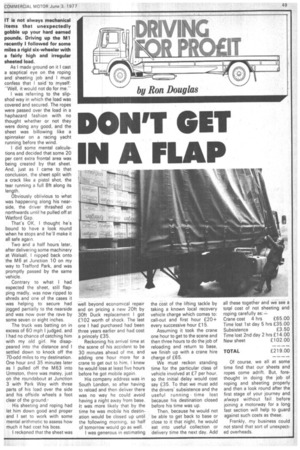DON'T GET IN A FLAP
Page 51

If you've noticed an error in this article please click here to report it so we can fix it.
IT is not always mechanical items that unexpectedly gobble up your hard earned pounds. Driving up the M recently I followed for some miles a rigid six-wheeler with a fairly high and irregular sheeted load.
As I made ground on it I cast a sceptical eye on the roping and sheeting job and I must confess that I said to myself: "Well, it would not do for me.
1 was referring to the slipshod way in which the load was covered and secured. The ropes were passed over the load in a haphazard fashion with no thought whether or not they were doing any good, and the sheet was billowing like a spinnaker on a racing yacht running before the wind.
I did some mental calculations and decided that some 20 per cent extra frontal area was being created by that sheet. And, just as I came to that conclusion, the sheet split with a crack like a pistol shot, the tear running a full 8ft along its length.
Obviously oblivious to what was happening along his nearside, the driver thrashed on northwards until he pulled off at Watford Gap, That's OK, I thought he's bound to have a look round when he stops and he'll make it all safe again.
Two and a half hours later, after delivering some machinery at Walsall, I nipped back onto the M6 at Junction 10 on my way to Trafford Park, and was promptly passed by the same vehicle.
Contrary to what I had expected the sheet, still flapping madly, was now ripped to shreds and one of the cases it was helping to secure had jogged partially to the nearside and was now over the rave by some seven or eight inches.
The truck was batting on in excess of 60 mph I judged, and I had no chance of catching him with my old girl. He disappeared into the distance and I settled down to knock off the 70-odd miles to my destination. One hour and 35 minutes later as I pulled off the M63 into Urmston, there was matey, just on the roundabout at Junction 3 with Park Way with three parts of his load over the side and his offside wheels a foot clear of the ground.
His sheeting and roping had let him down good and proper and I set to work with some mental arithmetic to assess how much it had cost his boss.
I reckoned that the sheet was
well beyond economical repair and on pricing a new 20ft by 3.0ft Duck replacement I got £102 worth of shock. The last one I had purchased had been three years earlier and had cost a princely £35.
Reckoning his arrival time at the scene of his accident to be 30 minutes ahead of me, and adding one hour more for a crane to get out to him, I knew he would lose at least five hours before he got mobile again.
His company address was in South London, so after having to reload and then deliver there was no way he could avoid having a night away from base. It was more likely that by the time he was mobile his destination would be closed up until the following morning, so half of tomorrow would go as well. • I was generous in estimating the cost of the lifting tackle by taking a known local recovery vehicle charge which comes to: call-out and first hour £20+ every successive hour £15.
Assuming it took the crane one hour to get to the scene and then three hours to do the job of reloading and return to base, we finish up with a crane hire charge of £65.
We must reckon standing time for the particular class of vehicle involved at £7 per hour, so the initial delay would cost say £35. To that we must add the drivers' subsistence and the useful running time lost because his destination closed before his time was up.
Then, because he would not be able to get back to base or close to it that night, he would .eat into useful collection or delivery time the next day. Add
all these together and we see a total cost of not sheeting and roping carefully as: Crane cost 4 hrs £65.00 Time lost 1st day 5 hrs £35.00 Subsistence £3.50 Time lost 2nd day 2 hrs £14.00 New sheet £102.00 — — —
TOTAL £219.00 — —
Of course, we all at some time find that our sheets and ropes come adrift. But, forethought in doing the job of roping and sheeting properly and then a look round after the first stage of your journey and always without fail before joining a motorway for a long fast section will help to guard against such costs as these.
Frankly, my business could not stand that sort of unexpected overheads.




















































































































